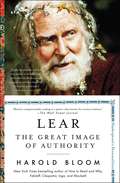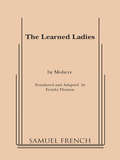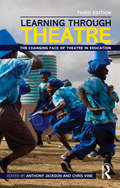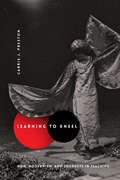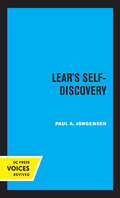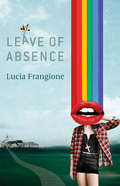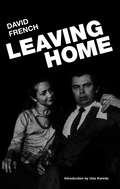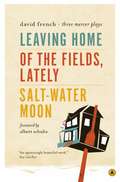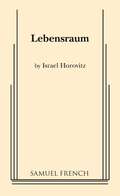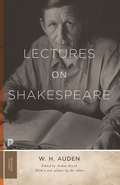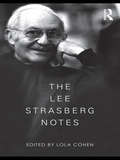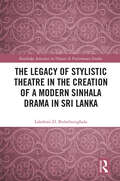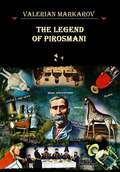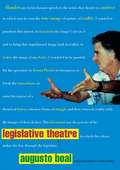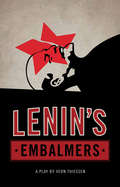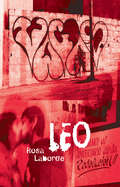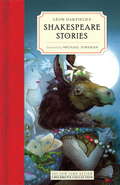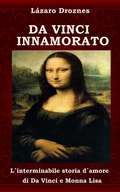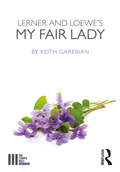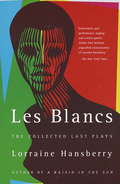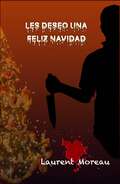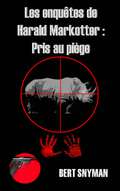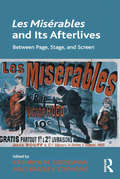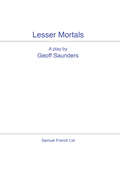- Table View
- List View
Lear: The Great Image of Authority (Shakespeare's Personalities #Vol. 39)
by Harold BloomHarold Bloom, regarded by some as the greatest Shakespeare scholar of our time, presents an intimate, wise, deeply compelling portrait of King Lear—the third in his series of five short books about the great playwright’s most significant personalities, hailed as Bloom’s “last love letter to the shaping spirit of his imagination” on the front page of The New York Times Book Review.King Lear is perhaps the most poignant character in literature. The aged, abused monarch—a man in his eighties, like Harold Bloom himself—is at once the consummate figure of authority and the classic example of the fall from majesty. He is widely agreed to be William Shakespeare’s most moving, tragic hero. Award-winning writer and beloved professor Harold Bloom writes about Lear with wisdom, joy, exuberance, and compassion. He also explores his own personal relationship to the character: Just as we encounter one Emma Bovary or Hamlet when we are seventeen and another when we are forty, Bloom writes about his shifting understanding—over the course of his own lifetime—of Lear, so that this book also explores an extraordinarily moving argument for literature as a path to and a measure of our humanity. Bloom is mesmerizing in the classroom, wrestling with the often tragic choices Shakespeare’s characters make. He delivers that kind of exhilarating intimacy, pathos, and clarity in Lear.
The Learned Ladies
by Freyda Thomas MoliereThis rollicking version of Les Femmes Savantes delighted audiences Off Broadway in a production starring Jean Stapleton as Philamente, a most unliterary lady intent on having a high toned literary salon. She has neither literary nor common sense, which makes her easy prey for sycophantic con artist Trissotin. He passes himself off as a famous poet and becomes a permanent house guest. Philamente hopes to marry her daughter to Trissotin, but the daughter wishes to marry the unsuitable Clitandre. This version strays from a strictly literal translation of Moliere's play, often employing anachronisms in the rhymed couplets that will appall purists and absolutely delight everyone else. If you want your audiences to roll with laughter as they watch a play by a "famous dead playwright," this version is for you.
Learning Through Theatre: The Changing Face of Theatre in Education
by Anthony Jackson Chris VineIn the two decades since the publication of the second edition, Learning Through Theatre has further established itself as an indispensable resource for scholars, practitioners and educators interested in the complex interrelations between teaching and learning, the performing arts, and society at large. Theatre in Education (TIE) has consistently been at the cutting edge of the ever-growing field of Applied Theatre; this comprehensively revised new edition makes an international case for why, and how, it will continue to shape ways in which the participatory arts contribute to the learning of young people (and increasingly, adults) in the 21st century. Drawing on the experiences and insights of theorists and practitioners from across the world, Learning Through Theatre shows how theatre can, and does, promote: participatory engagement; the use of innovative theatrical form; work with young people and adults in a range of educational settings; and social and personal change. Now transatlantically edited by Anthony Jackson and Chris Vine, Learning Through Theatre offers exhilarating new reflections on the book’s original aim: to define, describe and debate the salient features, and wider political context, of one of the most important – and radical – developments in contemporary theatre.
Learning to Kneel: Noh, Modernism, and Journeys in Teaching (Modernist Latitudes)
by Carrie J. PrestonIn this inventive mix of criticism, scholarship, and personal reflection, Carrie J. Preston explores the nature of cross-cultural teaching, learning, and performance. Throughout the twentieth century, Japanese noh was a major creative catalyst for American and European writers, dancers, and composers. The noh theater’s stylized choreography, poetic chant, spectacular costumes and masks, and engagement with history inspired Western artists as they reimagined new approaches to tradition and form. In Learning to Kneel, Preston locates noh’s important influence on such canonical figures as Pound, Yeats, Brecht, Britten, and Beckett. These writers learned about noh from an international cast of collaborators, and Preston traces the ways in which Japanese and Western artists influenced one another.Preston’s critical work was profoundly shaped by her own training in noh performance technique under a professional actor in Tokyo, who taught her to kneel, bow, chant, and submit to the teachings of a conservative tradition. This encounter challenged Preston’s assumptions about effective teaching, particularly her inclinations to emphasize Western ideas of innovation and subversion and to overlook the complex ranges of agency experienced by teachers and students. It also inspired new perspectives regarding the generative relationship between Western writers and Japanese performers. Pound, Yeats, Brecht, and others are often criticized for their orientalist tendencies and misappropriation of noh, but Preston’s analysis and her journey reflect a more nuanced understanding of cultural exchange.
Learning to Kneel: Noh, Modernism, and Journeys in Teaching (Modernist Latitudes)
by Carrie J. PrestonIn this inventive mix of criticism, scholarship, and personal reflection, Carrie J. Preston explores the nature of cross-cultural teaching, learning, and performance. Throughout the twentieth century, Japanese noh was a major creative catalyst for American and European writers, dancers, and composers. The noh theater's stylized choreography, poetic chant, spectacular costumes and masks, and engagement with history inspired Western artists as they reimagined new approaches to tradition and form. In Learning to Kneel, Preston locates noh's important influence on such canonical figures as Pound, Yeats, Brecht, Britten, and Beckett. These writers learned about noh from an international cast of collaborators, and Preston traces the ways in which Japanese and Western artists influenced one another. Preston's critical work was profoundly shaped by her own training in noh performance technique under a professional actor in Tokyo, who taught her to kneel, bow, chant, and submit to the teachings of a conservative tradition. This encounter challenged Preston's assumptions about effective teaching, particularly her inclinations to emphasize Western ideas of innovation and subversion and to overlook the complex ranges of agency experienced by teachers and students. It also inspired new perspectives regarding the generative relationship between Western writers and Japanese performers. Pound, Yeats, Brecht, and others are often criticized for their orientalist tendencies and misappropriation of noh, but Preston's analysis and her journey reflect a more nuanced understanding of cultural exchange.
Lear's Self-Discovery
by Paul A. JorgensenThis title is part of UC Press's Voices Revived program, which commemorates University of California Press’s mission to seek out and cultivate the brightest minds and give them voice, reach, and impact. Drawing on a backlist dating to 1893, Voices Revived makes high-quality, peer-reviewed scholarship accessible once again using print-on-demand technology. This title was originally published in 1967.
Leave of Absence
by Lucia FrangioneA small prairie community is blown apart when an audacious teenaged girl challenges long-held views of spirituality and sexuality. Suspected of being gay, she is brutalized by her classmates. This searing drama of bigotry and transcendence challenges the fallout of the Catholic Church's response to the same-sex marriage rulings in Canada.Award-winning playwright and actor Lucia Frangione has emerged as an important post-feminist voice in the theater, boldly questioning the institutions of religion, sexuality, and the family. Her accessible and entertaining plays utilize satire as a tool for critical thought and tackle complex themes with wit and courage.
Leaving Home
by David FrenchDavid French's first play is a classic in Canadian drama. The first part of what has come to be known as the Mercer Series, Leaving Home tells the story of a Newfoundland family that has emigrated and lost all sense of its place in the world. Leaving Home was named one of the 100 Most Influential Canadian Books by the Literary Review of Canada.
Leaving Home, Of the Fields, Lately, and Salt-Water Moon: Three Mercer Plays
by David FrenchDavid French's award-winning plays Leaving Home, Of the Fields, Lately and Salt-Water Moon are available for the first time in a special one-volume edition, with an introduction by Albert Schultz. Set in the 1950s, Leaving Home tells the story of the Mercers, a Newfoundland family who have emigrated to the mainland and lost all sense of their place in the world. In Of the Fields, Lately, the emotionally charged sequel to Leaving Home, young Ben Mercer returns home after being gone for two years and confronts the family he left behind. Salt-Water Moon was written later than the other two plays but tells the earlier story of the courtship of Jacob and Mary Mercer in Newfoundland. Leaving Home was named one of the 100 Most Influential Canadian Books by the Literary Review of Canada. Of the Fields, Lately won the Chalmers Award in 1973, and Salt-Water Moon won the Canadian Authors Association Award for Drama, the Dora Mavor Moore Award for Best New Play, and the Hollywood Drama-Logue Critics' Award.
Lebensraum
by Israel HorovitzDrama / 2m, 1f / Using a cast of three to play 40 sharply drawn characters, this bold work of penetrating intelligence is based on the fanciful, explosive idea that a German Chancellor might, as an act of redemption, invite six million Jews to Germany and promise them citizenship and jobs. A resulting scenario unfolds that explores the effects of the policy on Jews and Gentiles with widely varying outlooks: an out of work Jewish dock worker from Massachusetts who brings his Irish wife and his son to Bremerhaven to start a new life, a survivor of Auschwitz who returns to find the woman who betrayed his family to the Nazis, a young German smitten by a Jewish American teenage girl, an unemployed German laborer and scores of others. The actors make quicksilver changes from one character to the next, occasionally using masks or character cut outs to enhance the transformations. The logical progression of this artfully drawn script raises the terrifying possibility that history may repeat.
Lectures on Shakespeare: Conferencias Sobre Shakespeare (Princeton Classics Ser. #45)
by W. H. AudenFrom one of the great modern writers, the acclaimed lectures in which he draws on a lifetime of experience to take the measure of Shakespeare's plays and sonnets "W. H. Auden, poet and critic, will conduct a course on Shakespeare at the New School for Social Research beginning Wednesday. Mr. Auden . . . proposes to read all Shakespeare's plays in chronological order." So the New York Times reported on September 27, 1946, giving notice of a rare opportunity to hear one of the century's great poets discuss at length one of the greatest writers of all time. Reconstructed by Arthur Kirsch, these lectures offer remarkable insights into Shakespeare's plays and sonnets while also adding immeasurably to our understanding of Auden.
The Lee Strasberg Notes
by Lola CohenThe Lee Strasberg Notes reproduces the original teachings of a unique voice in actor training, for the very first time. It is a stunning document in the history and ongoing practice of Strasberg’s Method. Compiled and edited by Lola Cohen, the book is based on unpublished transcripts of Strasberg’s own classes on acting, directing and Shakespeare. It recreates his theoretical approach, as well as the practical exercises used by his students, and brilliantly conveys his approach and personality. The book features Strasberg’s teachings on: • Training and exercises • Characters and scenes • Directing and the Method • Shakespeare and Stanislavski • The theater, acting and actors. Including a Preface by Anna Strasberg and a Foreword by Martin Sheen, this illuminating book brings the reader closer to Strasberg’s own methods than any other, making it a phenomenal resource for students, actors, and directors.
The Legacy of Stylistic Theatre in the Creation of a Modern Sinhala Drama in Sri Lanka (ISSN)
by Lakshmi D. BulathsinghalaThis book explores the development of Sinhala stylistic drama from its earliest manifestations to the post-independence era.Bulathsinghala examines the impact of indigenous and imported folk theatrical forms on the work of the most significant postcolonial stylistic dramatists and on key plays that they produced. In the process, the book explores a number of myths and misunderstandings regarding Sri Lanka’s folk heritage and seeks to establish more reliable information on the principal indigenous Sri Lankan folk dramatic forms and their characteristics. At the same time, by drawing connections between folk drama and the post-independence stylistic theatrical movement, the author demonstrates the essential role of the former in Sinhala culture prior to the advent of Western and other influences and shows how both continue to inflect Sri Lankan drama today.This book will help to open the field of South Asian drama studies to an audience consisting not only of scholars and students but also of general readers who are interested in the fields of drama and theatre and Asian studies.
The Legend of Pirosmani
by Valerian MarkarovSometimes amazing people live next to us, whose existence, even before the end of their earthly days, becomes a legend. Such is a lot of the chosen. They, feeding the lofty ideas of humanity, hear, see and feel what is inaccessible to ordinary mortals, and we do not notice them, do not cherish them. Such a creator, whose name is surrounded by a halo of immortality, was Niko Pirosmani. The stories that are told about him, no one can confirm or deny. But they are his biography. He created it himself with his amazing life. A life that turned into a Legend about the Master. And we have no right not to believe her…
Legislative Theatre: Using Performance to Make Politics (Augusto Boal)
by Augusto BoalAugusto Boal's reputation is now moving beyond the realms of theatre and drama therapy, bringing him to the attention of a wider public. Legislative Theatre is the latest and most remarkable stage in his work. 'Legislative Theatre' is an attempt to use Boal's method of 'Forum Theatre' within a political system to create a truer form of democracy. It is an extraordinary experiment in the potential of theatre to affect social change. At the heart of his method of Forum Theatre is the dual meaning of the verb 'to act': to perform and to take action. Forum Theatre invites members of the audience to take the stage and decide the outcome, becoming an integral part of the performance. As a politician in his native Rio de Janeiro, Boal used Forum Theatre to motivate the local populace in generating relevant legislation. In Legislative Theatre Boal creates new, theatrical, and truly revolutionary ways of involving everyone in the democratic process. This book includes: * a full explanation of the genesis and principles of Legislative Theatre * a description of the process in operation in Rio * Boal's essays, speeches and lectures on popular theatre, Paolo Freire, cultural activism, the point of playwrighting, and much else besides.
Lenin's Embalmers
by Vern ThiessenWhen Boris Zbarsky and Vladimir Vorobiev, two Jewish biochemists, are recruited by Josef Stalin to embalm Lenin after his death, both men are pushed to their limits in preserving the former Soviet leader so that he may physically live forever. Driven by fear and fame, both men attempt to achieve the impossible, but discover a dark secret. If they should succeed the rewards will be boundless, but failure can bring only one outcome. Based on a true story, Governor General's Literary Award winning playwright Vern Thiessen brings us a dark comedy that brings to light the resilience of the human spirit, ever-changing war games, and the importance of always having vodka on hand.
Leo
by Rosa LabordeSet in Santiago, Chile, three young friends form a bittersweet love triangle during the political upheaval surrounding President Salvador Allende’s assassination. Told through Leo’s memories, the play travels through childhood, first friends, and first loves. Passion and poetry weave together in this story of innocence disappeared.
Leon Garfield's Shakespeare Stories
by Michael Foreman Leon GarfieldHow to introduce children to Shakespeare, not just to the stories behind the plays but to the richness of Shakespeare's language and the depth of his characters: That's the challenge that Leon Garfield, no slouch as a wordsmith himself, sets out to meet in his monumental and utterly absorbing Shakespeare Stories. Here twenty-one of the Bard's plays are refashioned into stories that are true to the wit, the humor, the wisdom, the sublime heights, the terrifying depths, and above all the poetry of their great originals. Throughout, Garfield skillfully weaves in Shakespeare's own words, accustoming young readers to language and lines that might at first seem forbiddingly unfamiliar. Leon Garfield's Shakespeare Stories is an essential distillation--a truly Shakespearean tribute to Shakespeare's genius and a delight for children and parents alike.
Leonardo Innamorato
by Lázaro Droznes Federica CostaLeonardo da Vinci riceve nella sua bottega di Firenze Monna Lisa Gherardini al fine di realizzare un ritratto ordinato dal marito. Da Vinci trattiene il dipinto in suo potere; non arriverà mai a consegnarlo al cliente per portarlo con sé in ogni suo trasferimento fino alla fine dei suoi giorni. Fu un lungo idillio con la donna ideale, prolungatosi per il resto della sua vita, nel corso di vent'anni di costanti ritocchi. La presente finzione drammatica ricrea il rapporto di Leonardo con la Gioconda, con il suo assistente Salaì e con la natura, nella sua ricerca della verità e della bellezza. La pittura continua ad appassionare dopo svariati secoli l'intera umanità, ponendo le stesse domande che si sarà posto Da Vinci: perché sorride La Gioconda? Quale mistero cela questa donna? Quale mistero celano le donne? Come avrebbe detto il gran Leonardo: "la bellezza è verità e la verità è bellezza". Quest'opera tenta di penetrare in questi misteri che impregnano l'intera opera di Da Vinci.
Lerner and Loewe's My Fair Lady (The Fourth Wall)
by Keith Garebian"An Englishman's way of speaking absolutely classifies him,The moment he talks he makes some other Englishman despise him." - Henry George Bernard Shaw famously refused to permit any play of his "to be degraded into an operetta or set to any music except its own." Allowing his beloved Pygmalion to be supplanted by a comic opera was therefore unthinkable; yet Lerner and Loewe transformed it into My Fair Lady (1956), a musical that was to delight audiences and critics alike. By famously reversing Shaw’s original ending, the show even dared to establish a cunningly romantic ending. Keith Garebian delves into the libretto for a fresh take, and explores biographies of the show’s principal artists to discover how their roles intersected with real life. Rex Harrison was an alpha male onstage and off, Julie Andrews struggled with her ‘chaste diva’ image, and the direction of the sexually ambiguous Moss Hartcontributed to the musical’s sexual coding.
Les Blancs: The Collected Last Plays
by Lorraine HansberryHere are Lorraine Hansberry's last three plays--Les Blancs, The Drinking Gourd, and What Use Are Flowers?--representing the capstone of her achievement. Includes a new preface by Jewell Gresham Nemiroff and a revised introduction by Margaret B. Wilkerson.
Les deseo una feliz Navidad
by Laurent MoreauEn la escuela, un grupo, parece genial. ¿Qué se puede decir cuando se escoge a alguien que parece más débil que los demás y sale mal? Una vida destruida, un malestar... ¡Una venganza! ¡Se dice que la venganza es un plato que se sirve frío! Bueno, no es más que un doble eufemismo...
Les enquêtes de Harald Markotter : Pris au piège
by Bert SnymanMAIS OÙ EST DONC PASSÉE GRIETA ? Un des animaux les plus emblématiques de la faune du pays est menacé et pourrait bien disparaitre si le mal triomphe du bien. Ce roman policier, qui se déroule au Cap, aborde un thème central dans la société sud-africaine, ainsi que celle d’autres pays africains. Harry, le héros du roman, est un détective privé qui se trouve confronté à un blocage psychologique inhabituel, une situation bien éloignée de ses enquêtes ordinaires et à laquelle il ne peut faire face seul. Le caractère imprévisible de l’action et des événements, ainsi que leur enchainement, prend les différents personnages au dépourvu : pas seulement le détective privé aguerri, mais aussi son grand amour, ses amis et associés, et même le scélérat diabolique de cette histoire. Péripéties, coups de théâtre et retournements de situation : impossible de deviner comment le récit va se terminer et nulle surprise si la fin est tout à fait inattendue ! Où est Grieta ? Qu’est-elle devenue ? Ce n’est qu’à la toute fin du livre Pris au piège que le lecteur connaitra la réponse. L’histoire nous transporte aussi dans la province du Cap-Nord de la fin du dix-neuvième siècle, là où tout a commencé… Le roman Pris au piège oppose le Bien et le Mal, un thème particulièrement d’actualité dans le monde dans lequel nous vivons aujourd’hui. Dans cette confrontation, qui va l’emporter ? La réponse reste en suspens jusque dans les dernières lignes du livre. Qui est bon ? Qui est mauvais ? Rien n’est jamais sûr, et on peut parfois être déçu. Les capacités de discernement de Harry vont être mises à rude épreuve et la responsabilité qu’il porte sur ses épaules est immense…
Les Misérables and Its Afterlives: Between Page, Stage, and Screen
by Kathryn M. Grossman Bradley StephensExploring the enduring popularity of Victor Hugo’s Les Misérables, this collection offers analysis of both the novel itself and its adaptations. In spite of a mixed response from critics, Les Misérables instantly became a global bestseller. Since its successful publication over 150 years ago, it has traveled across different countries, cultures, and media, giving rise to more than 60 international film and television variations, numerous radio dramatizations, animated versions, comics, and stage plays. Most famously, it has inspired the world's longest running musical, which itself has generated a wealth of fan-made and online content. Whatever its form, Hugo’s tale of social injustice and personal redemption continues to permeate the popular imagination. This volume draws together essays from across a variety of fields, combining readings of Les Misérables with reflections on some of its multimedia afterlives, including musical theater and film from the silent period to today's digital platforms. The contributors offer new insights into the development and reception of Hugo's celebrated classic, deepening our understanding of the novel as a work that unites social commentary with artistic vision and raising important questions about the cultural practice of adaptation.
Lesser Mortals
by Geoff SaundersFour women — all widows — sit in the communal silence of a Quaker Meeting; we hear their thoughts and join with their joys and troubles. Victoria, the most recently widowed, is resigned to never getting answers to her questions. Wendy has kept her home life secret for years. Tilly’s husband was far from good to her. Elderly Gladys cherishes the memories of her alcoholic beau. Faith, grief, marriage, love and “Quakerly behaviour” are among the themes discussed in this tender and sometimes humorous short drama.
